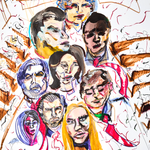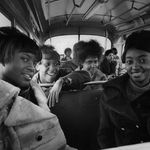
When John Patrick Shanley’s Outside Mullingar opened on Broadway in 2014, reviews were mostly warm. Charles Isherwood in the New York Times called the romance between neighboring Irish farmers — one played by stage veteran Brian F. O’Byrne, the other by Debra Messing — “wholly diverting,” praising Shanley’s “lyrical writing” for giving “such consistent pleasure.” The Hollywood Reporter’s David Rooney hailed it as “a tender paean to rural life, to the Irish spirit, and to the enduring belief that love will find a way.” Tony voters enjoyed Outside Mullingar so much that they nominated it for Best Play, though it lost to the Bryan Cranston as LBJ drama All the Way — an act of AMC on NBC violence.
Then there was Fintan O’Toole’s review in the Irish Times, which began, “When plays are bad, their badness is usually easy to explain. Occasionally, though, there is a play whose woefulness demands a whole new theory,” and went on to call Outside Mullingar both “mystifyingly awful” and “unfathomably bad.”
It turned out O’Toole was merely the warm-up act. Six years later, Shanley has adapted Outside Mullingar for the screen, renaming it Wild Mountain Thyme, casting Emily Blunt, Jamie Dornan, and America’s own Christopher Walken as the leads and making them say things like, “It were hey dat kissed mey!” When the film’s trailer dropped in November, seemingly all of Ireland was united in savaging the project. “What in the name of holy bejaysus and all the suffering saints is this benighted cowpat?” asked one columnist. Said a YouTube commenter: “This is worse than the Famine.”
Shanley has argued that the film wasn’t made for them; it was made for people like me, a Northern Irish American who loves Guinness, the smell of peat, and constantly bringing up The Troubles. And you know what, he was right. While I absolutely did not think Wild Mountain Thyme was a good movie — like The Room, it tessellates on that elusive wavelength where, even in the moment you’re watching it, you cannot believe it actually exists — I could not deny that the film’s bejaysus-ly broad depiction of Ireland had a hold on me nevertheless. Give me a scene where characters banter in a pub with diddly-dee music in the background and I am constitutionally unable to look away. For those of us whose experience with Ireland is limited to family legend and periodic vacations, Wild Mountain Thyme transports us to a magical dreamworld where fashion and technology has not progressed past 1956, where everyone speaks in the poetry of Yeats, and where it’s always tree-tirty.
Still, the contrasting national reactions to the movie intrigued me. To get an Irish perspective on the issue, I decided to call up columnist and author Séamas O’Reilly, who besides being one of my favorite writers also once described the performances in the Wild Mountain Thyme trailer as “spudface.” He happily agreed to act as a spokesman for every single person in Ireland.
I read the reviews of the Outside Mullingar, and the American reviews were moderately positive. But then the Irish reviews were like, “This thing is awful.” These depictions of Irishness, they’re not intentionally offensive, I think the makers probably go into them with a bit of love. But when they get across the Atlantic, people do not enjoy them. I’d like to get your perspective on that disparity.
I think a lot of it has to be taken in good humor. A lot of the time, simplifications are necessary to make a work of art. I don’t think it would be necessary or desirable for things to be completely, absolutely, hewn to the lived experiences of the people. If it was, then I could never write about anything that wasn’t my own life.
But the second thing is, in an Irish context, there’s a big history of Irishness being portrayed in ways that are, I would say, objectively harmful. Thankfully, there’s been an evolution in the standing of Irish people. I think we’ve become less of a bedraggled, loathed, vermin class of people that we were often portrayed as, in everything from Punch cartoons to British radio serials to American anti-Irish propaganda. Then in the ’50s and ’60s, it was more of a silly, simplistic, quite sentimental view of Ireland. Now it’s kind of just a mishmash of weird stereotypes and odd touchstones, most of which were invented in America.
Most of the time, it’s actually just laughable, and I think with Wild Mountain Thyme, it kind of transgressed being offensive. Irish people don’t take themselves that seriously. We understand where we are in the pecking order of aggrieved peoples. In terms of our status in the world, we’re not exactly second-class citizens, so the actual harm that this sort of stuff does is very negligible. One thing that is specific to Irish people is that we are ruthlessly sarcastic and incredibly eager to engage with these myths about ourselves because we find them really entertaining. It brings people together. In the absence of having a right to be genuinely offended, we at least preserve the right to mercilessly take the piss.
When you say that many of these tropes were actually invented in America, what do you mean?
For example, I’ve definitely never met an Irish person who said, “Top of the morning to you.” I’m presuming at some point someone actually did say that, but to an American.
And an awful lot of things like Darby O’Gill and the Little People. Walt Disney could trace his lineage back to Irish stock. He was fascinated with Irishness and Irish tradition, and that filters through in some of his work, but most prominently in Darby O’Gill, the idea that the stock Irish accent is that sort of west coast [accent]:“Diddly aye, to be sure, to be sure.” Even though it’s accurate, it’s such a specific part of Ireland. It’s like if every single American accent you had in a film, they were from Minnesota. It’s just weird, even without getting into the question of whether it’s accurate.
Then you get to whether it’s accurate, and it’s just bewildering. Christopher Walken, as far as I’m concerned, can do no wrong. But he made some terrible choices.
That’s the weird thing. It’s not as if there is a lack of older Irish actors who could have played that part: Colm Meaney, Brendan Gleeson. But we also have to deal with the fact that Jamie Dornan’s accent is not great, either. I suppose he couldn’t use his Belfast accent, but still.
But he could. People from Belfast end up in [the Republic of Ireland]. The thing about Ireland is that it’s tiny, right? It’s about four hours across to drive, about nine hours [north to south]. So that is literally like someone from Seattle living in Portland. It’s very, very normal.
To defend the movie somewhat, he is playing Walken’s son, and they are supposed to be Nth-generation farmers.
True. But these are not what I would call insurmountable textual hurdles.
Another thing about things that originated in America: An awful lot of the St. Patrick’s Day tropes are American. They’ve come a little bit from Irish tradition and a little bit from other traditions. In many ways, their Irishness is overstated. But they get sold back to us, and we gleefully buy it back. You take the original, turn it into a diddly-fied version, and we take it back and we love it.
But it doesn’t always work with cinema. I mean, there are classics that are pretty well-liked in Ireland: The Quiet Man, Ryan’s Daughter, stuff like that. And generally speaking, we’re very appreciative whenever someone does a great accent. Judi Dench in Philomena, fantastic accent. Cate Blanchett in Veronica Guerin, impeccable. But once you start hearing that west Kerry Darby O’Gill stuff, it’s like, Oh, you haven’t really tried.
That’s interesting that you say Irish people are generally very happy to interact with those broader, American-made tropes. Why do you think that is?
Irish people are very open about the fact that we like it when we’re noticed. We’re a very small country who punch far above our weight in terms of world recognition. It doesn’t make any sense. We’re the size of Costa Rica and we have a lot of notable people, but sometimes we do feel like we get forgotten, that people haven’t spoken about us enough in the last two weeks. I wrote a little piece in the Guardian about the sense that whenever Irish American politicians show their support, it clings them to our breasts. [When American politicians visit Ireland] there’ll be parties in the streets. Outside, this is interpreted as being purely about tribalism. But it’s mostly just injecting a little bit of interest in world events by seeing it through Ireland. Bill Clinton, for example, has negligible Irish ancestry and had no proof of any of it, and we were like, “Ah, no worries. It’s fine.”
“I’m sure it’s in there somewhere.”
It’s not done with any seriousness. Ireland has one of the world’s longest running chat shows, The Late Late Show. They’ll have Tom Hanks or they’ll have Julia Roberts, and you only need to watch for literally three minutes before they ask something about, “Do you like Ireland? Have you ever been to Ireland? I hear your great-grandmother is from Ireland.” It’s this kind of playing to the gallery thing, which is sycophantic and desperate — but also undeniably really popular. People like the idea that these rich and famous people are thinking about Ireland. For the most part it’s harmless. If you can get the accents right, we’ll buy it up. So that’s what makes the failures so mystifying, because that is an absolute open goal. But then, we’re not the market.
John Patrick Shanley has said something similar, that this is a movie for people who dream of Ireland, not necessarily the Irish themselves.
The Fintan O’Toole review that you mentioned earlier is amazing because Fintan is a very skilled writer. He’s very funny about a lot of the things that he picks up. We haven’t seen the play. Very few people have, in the grand scheme of things. To see it in the flesh around loads of other people, I wonder what that would be like for Irish people. When we formed that pitchfork mob on trailer day, it felt really good. But I wonder, if I had been swept up in the amazing cast, with 200 of the New York intelligentsia all laughing around me, would that make a difference? Would I still be soberly tut-tutting at the accent? Or would I have just put that in a box, then taken the positives from it? I’d like to think that I’d enjoy it.
Anyway, I saw an interview with Shanley. He seems a wee defensive about it.
He apparently has family outside Mullingar, and he intended the story as a love letter to his ancestry. I get it. I go to Donegal with my cousins every few years. I imagine if I made a movie about Donegal and presented it like, “I’m going to show the world how great it is,” actual people in Donegal would be like “This guy.”
I grew up on the border of Derry and Donegal. My bedroom basically looked out towards Letterkenny. And Donegal is beautiful and amazing. But if I wrote about Donegal as a border [resident] …
Is there a part of Irish culture that doesn’t make it into the Hollywood version that you think should?
I have two. One is ordinary working- and middle-class Irish life in the 21st century. It’s very, very rare that you see a non-period piece in which Ireland is not just a backdrop. It’s so rare that I can just kind of name them. Obviously Normal People, one of the things that was so striking was it was so specific to time and place. That’s something I’d quite like to see a bit more of: just normal Irish people doing normal Irish things, though the word “normal” has been annoyingly co-opted now by Normal People. And there’s nothing about Northern Ireland that isn’t about The Troubles, which is why even The Fall was refreshing. When I was growing up there, people fell out, fell in love, organized charity football matches — I’m just thinking of templates of British dramas — why wouldn’t that happen in Derry? There was a period in time when Roddy Doyle’s popularity led to very good kitchen-sink dramas in Dublin, but they became almost their own genre. You wouldn’t get that sort of thing about a family in Derry, for example, because it seemed “too Dublin” to do that.
A lot of the stuff that we get, either in Irish media or made from other places, it’s the same four stories again and again. But I think contemporary Irish animation shows that you can do mythical stories, you can do fantastical stories, you can do horror stories. There’s probably not the market or the production budgets to make those kinds of movies anymore. But I’d like to see that.





